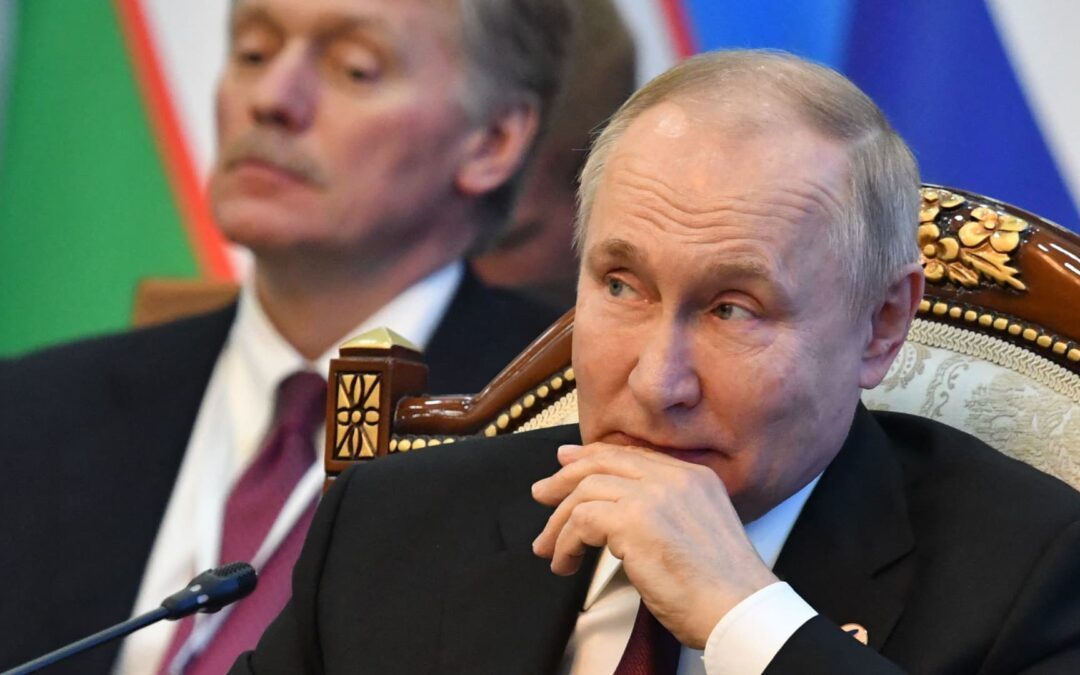Ukrainian president visits front-line village of Robotyne
Ukrainian President Volodymyr Zelensky visited troops at the front-line village of Robotyne in southern Ukraine over the weekend.
Ukrainian forces recaptured the village in the Zaporizhzhia region last August, describing the liberation as a significant breakthrough during their summer counteroffensive. Overall progress was slow, however, and only a handful of villages were recaptured from Russian forces.
Empty tank shells are seen on a snow-covered field during winter near Robotyne, Zaporizhzhia, Ukraine on January 22, 2024.
Anadolu | Anadolu | Getty Images
Describing Robotyne as “one of the toughest parts of the front” Zelenskyy said he met soldiers of the 65th Mechanized Brigade and handed out awards to those who “distinguished themselves in battles these weeks.”
Zelenskyy then held a security meeting in Zaporizhzhia, talking to officials about the region, its capital and heard reports from military commanders, both on the region and on another fighting hot spot, Avdiivka in Donetsk. There has been speculation that Zelenskyy could replace the head of his armed forces in a shake-up of the military, and potentially other ministries.
On Sunday, Zelenskyy appointed Ivan Fedorov as the new head of Zaporizhzhia Regional State Administration. Fedorov, the former mayor of Russian-occupied Melitopol, said after the appointment that his “goal remains unchanged: to join forces to bring Ukraine’s victory closer. I did this as mayor of the city. Now I’ll continue at the regional level.”
— Holly Ellyatt
Kremlin downplays level of support for anti-war election candidate hopeful Boris Nadezhdin
A challenger to Russian President Vladimir Putin’s long reign in office has emerged from an unlikely place — within Russia’s political establishment — in the form of Boris Nadezhdin.
Standing on a platform for peace with Ukraine, friendly and cooperative global relations and fair elections, as well as a fairer civil society and smaller state, Nadezhdin submitted his bid to run for the presidency last week. Russia’s presidential election will be held March 15-17.
Boris Nadezhdin, Civic Initiative party’s candidate for Russia’s 2024 presidential election, bringing 105,000 signatures to the polling station in Moscow, Russia on January 31, 2024.
Boris Nadezhdin Press Service/Handout/Anadolu via Getty Images
The Kremlin sought to dismiss Nadezhdin’s potential to upset an election whose win for Putin is seen as a done deal. Kremlin Press Secretary Dmitry Peskov told CNBC that “we are not inclined to exaggerate the level of support for Mr. Nadezhdin.”
Political analysts say it’s likely that Russia’s Central Election Commission will find fault this week with Nadezhdin’s bid to get his name on the ballot paper.
Nonetheless, the fact that Nadezhdin is even attempting to stand for election on an anti-war platform — and has garnered a certain level of public support — shows there is public appetite for his views, and that’s likely to make the Kremlin nervous after it has staked its political legacy and future on a victory in Ukraine.
Read more here: Russian war critic poses an awkward challenge for Putin and the Kremlin as the election nears
— Holly Ellyatt
Senate releases $118 billion bipartisan aid proposal for Israel, Ukraine, border security
Senators on Sunday released the details of a $118.2 billion bipartisan aid proposal for Ukraine, Israel and the southern U.S. border, after months of painstaking, closed-door negotiations.
The long-awaited bill requests $60.1 billion for Ukraine aid, $14.1 billion for Israel and $20.2 billion to improve security at the U.S. border. It also includes smaller pockets of funding for humanitarian assistance in war-torn regions, and defense operations in the Red Sea and Taiwan.
Ukrainian servicemen listen a high ranking officer after military exercises by assault units in Zhytomyr region on January 30, 2024, amid Russian invasion in Ukraine.
Sergei Supinsky | Afp | Getty Images
President Joe Biden initially proposed a more than $105 billion aid package in October. The Senate’s new deal roughly matches the funding proportions Biden had requested for Ukraine, Israel and Taiwan.
The central difference in the new proposal is over $13 billion more in border security funding, which was a major point of contention in the months-long Senate talks.
Republicans have criticized the Biden administration for its handling of the border, which has seen record numbers of migrant crossings in recent months. Democrats have countered that the president needs further executive authority to institute more aggressive border security.
The president said Sunday that he supports the Senate’s bipartisan proposal, including the term that gives him “new emergency authority to shut down the border when it becomes overwhelmed.”
“I urge Congress to come together and swiftly pass this bipartisan agreement. Get it to my desk so I can sign it into law immediately,” Biden said. Senate Majority Leader Chuck Schumer, D-N.Y., said a vote is scheduled for the bill on Wednesday.
Read more here: Senate releases $118 billion bipartisan aid proposal for Israel, Ukraine, border security
— Rebecca Picciotto
Unicredit CEO says business continues to be scaled down in Russia
Andrea Orcel, CEO of UniCredit, discusses the Italian lender’s business strategy in Russia.








